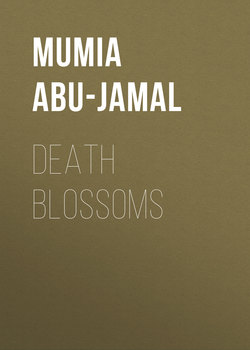Читать книгу Death Blossoms - Mumia Abu-Jamal - Страница 17
На сайте Литреса книга снята с продажи.
ОглавлениеThoughts on the Divine
An interviewer once asked the Mahatma Gandhi: “Gandhi-ji, it seems that you worship sometimes in temples, sometimes in churches, sometimes in mosques. What is your own religion?” Gandhi replied: “Follow me for a few days. Watch what I do; how I walk, what I say, and how I conduct myself generally. That is my religion.”
THERE ARE AS MANY religions as there are cultures, and equally many names for the divine presence that is the heart of each. The energizing influence of belief keeps them apart, for to each adherent they contain truth that, from his or her perspective, is the only truth. All the same, it seems they flow in one direction, like many streams seeking release into one mighty river.
My youthful search for meaning revealed that no matter how differently the Infinite was clothed in the garb of a certain religion, it was there. In each, I found a new perception of the greatest good, that is, a belief in God or some other personification of the divine principle. I found, as George Bernard Shaw puts it, that there is “only one religion, though there are a hundred versions of it.”
In Judaism, the ancient ancestral warrior is revered as all-powerful Yahweh, or Jehovah; to Christians, the Jewish carpenter Yeshuah is God yet also Man; for the Muslim, the ancient Meccan gods find fusion in one supreme being—Al-Lah, the God. In Hinduism, Lord Krishna emerges from a vast pantheon of ancient deities as a blue-black god who twirls and leaps in an eternal sacred dance. To the Buddhist, the insights of Gautama Siddhartha form the central core of a faith that holds the promise of enlightenment and the discovery of the true Self. In Santería, Condoblé, and Voudoun, the ancient gods of African antiquity have survived to smile behind the faces of the Catholic saints.
In the essence of each religion, then, we see a projection of the greatest good. For a threatened, nomadic desert tribe, what greater good than the worship of a mighty and powerful ancestor, a prominent warrior—Yahweh—who defended the clans? For the maligned followers of a Nazarethan carpenter, one crucified by the mightiest Empire of the age, why not the greater good of his victory over the tomb? For contentious Arab clans who saw each other through the lens of enmity and conflict, why not the clarity and simplicity of One God to reign over the throngs who crowd the K’aaba—One God to bring unity to a people, a region, a sphere of influence?
To Hindus, whose plethora of deistic personalities reflect the God-force that permeates all creation, Krishna—the beautiful, playful, dark boy-god who loves cattle and dances with other cowherds—turns the boring and mundane into a sacred act. For the Buddhist, Gautama’s attainment of enlightenment seeks the void beyond which no personality, human nor divine, exists. It bespeaks a greater good that sees past the soul to ultimate nothingness, a spiritual place of rest.
To millions of stolen and enslaved African peasants, for whom return to the grasslands, forests, and villages of the black motherland was physically impossible, their religion was the only means of a voyage home. Under a new, cooler sky, ancient gods and honored ancestors came to life once more and provided the greater good of spiritual survival, of an inner Self that could withstand the most dehumanizing assaults and empower the soul to remain sane. Even in the midst of a powerless existence, the world of the invisible pulsed with names like Yemonja, the goddess of the river; Obatala, chief of the gods; and Shango, the god of war and thunder.
Many of our ideas about God and religions simply mirror the traditions we have inherited from our forebears. They are imbibed with mother’s milk, openly, uncritically, freely—illogical human expressions, exercises in irrationality. Others are perceptions gained only by leaping into the dark arms of faith. God comes, in various faces, and numerous personalities, depending on our myriad perceptions, needs, and histories. Yet if there are any miracles left, it is that GOD IS ONE.
